Attention Google. There is a new player on the search engine scene.
Sure you’ve heard this before, but this time it’s serious.
ChatGPT (Generative Pre-trained Transformer) is a large language-focused learning model.
Using artificial intelligence (AI) and vast amounts of data, it can interact with users in dialog form, answer follow-up questions, admit mistakes, reject inappropriate requests, and even challenge false premises.
This chatbot, developed by OpenAI, is not a direct competitor to Google per se, but it is changing the way searches are conducted. And this will dramatically change the shape of search engine optimization.
In this article, we’re going to take a look at this technology and discuss how forward-thinking search engine optimizers are already using it to do their jobs.
What can you do with ChatGPT?
We are just beginning to unlock the potential for using machine learning and artificial intelligence in SEO and marketing.
ChatGPT is able to participate in discussions and answer questions in a way that is very close to a human.
It can write essays, fictional stories, poetry, and even ad copy—which is enough to make professional writers like me a little concerned.
It can be used to create content so accurately that the New York City Department of Education has banned its use for fear of fraud.
But more than content, ChatGPT is smart enough to be used for writing meta descriptions or debugging code. It is currently still a lengthy technical process to code with, but expect it to become much easier as the learning model grows in size.
It can also be used as a search assistant, providing answers to queries in clear and concise formats to save users from combing through multiple web pages to find answers to their questions.
For example, if you’re looking for a recipe for Beef Wellington instead of trawling through a dozen blog sites and scrolling past a lengthy story about how the blogger’s grandmother once made this dish for Winston Churchill, ChatGPT will give you a list of ingredients and preparation steps.
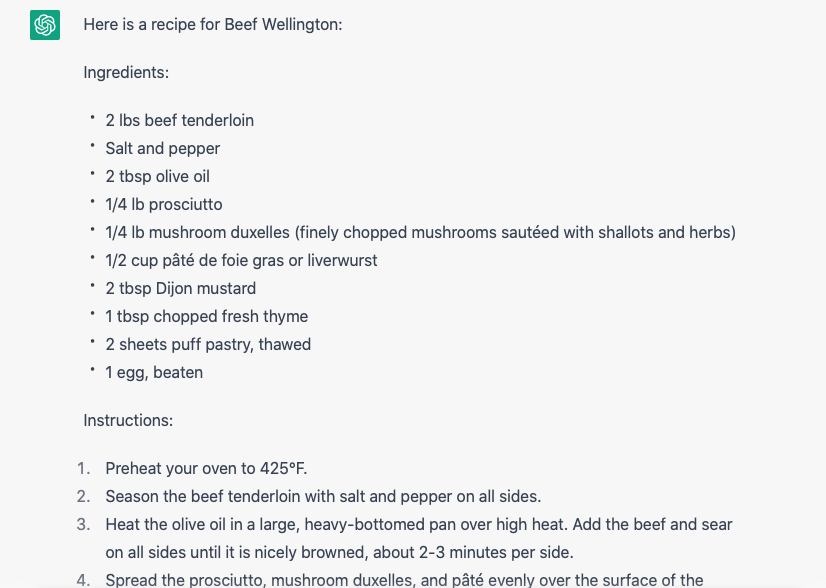 Screenshot of ChatGPT, January 2023
Screenshot of ChatGPT, January 2023As an SEO professional, this might sound a little scary.
But embracing AI technology instead of worrying about it might be a good move.
There are many ways you can use it to streamline your work and make redundant or repetitive tasks more efficient.
Let’s see how cutting-edge SEO pros are already using ChatGPT.
Ways SEO professionals are already using ChatGPT
1. Create content
Creating content can be tedious, especially when you don’t have an experienced (and humble) writer like me on the team.
Can ChatGPT do this for you? Well it canbut you probably should Don’t use it for writing web pages and blog posts.
In 2022, Google Search Advocate John Mueller said in no uncertain terms that the search engine considers content created with artificial intelligence to be spam, which is a violation of the company’s policies.
Currently, Google algorithms can identify and penalize AI-generated content, even those using anti-detection algorithms.
You should always use human oversight when working with AI.
However, anyone can safely use ChatGPT to create content for social media posts, email pitches, landing page copy for PPC, or even ad copy. It can also be a great brainstorming tool.
I asked ChatGPT, “What is SEO?”
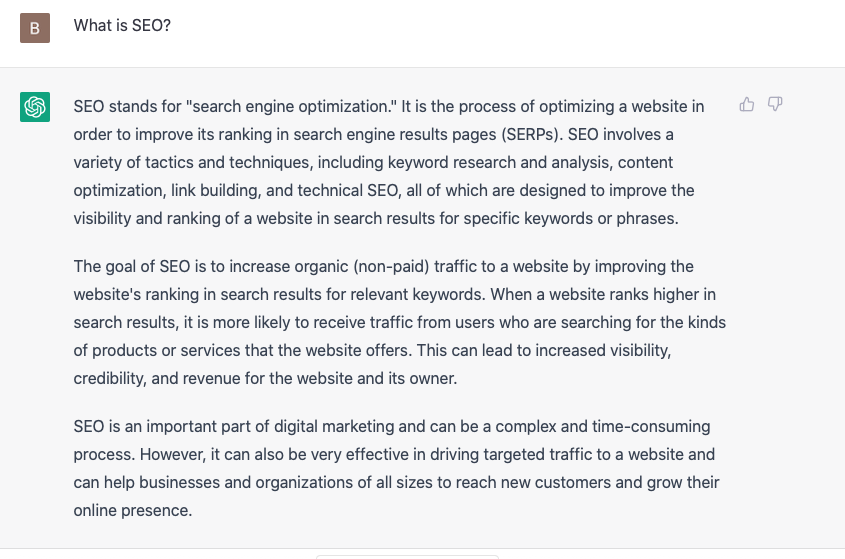 Screenshot of ChatGPT, January 2023
Screenshot of ChatGPT, January 2023In response, I received three well-written paragraphs that provide an overview of search engine optimization.
As long as you’re careful, ChatGPT could help streamline a lot of redundant content tasks like ad variations, but you have to always Check all generated content carefully, as it may contain inaccuracies.
2. Keyword research and analysis
Okay, so you are not willing to risk the penalties if you get caught creating content using ChatGPT. That doesn’t mean you can’t leverage its power as part of your content strategy.
ChatGPT makes keyword research virtually effortless.
All you have to do is open the chatbot and type in some of your target keywords and ask for related ones. ChatGPT creates a list of related keywords based on its understanding of the search results.
To try out this feature, I searched a list of keywords relevant to a banking software vendor.
A short time later, the chatbot presented me with a list of keywords and phrases that would have taken me much longer to find using traditional keyword research.
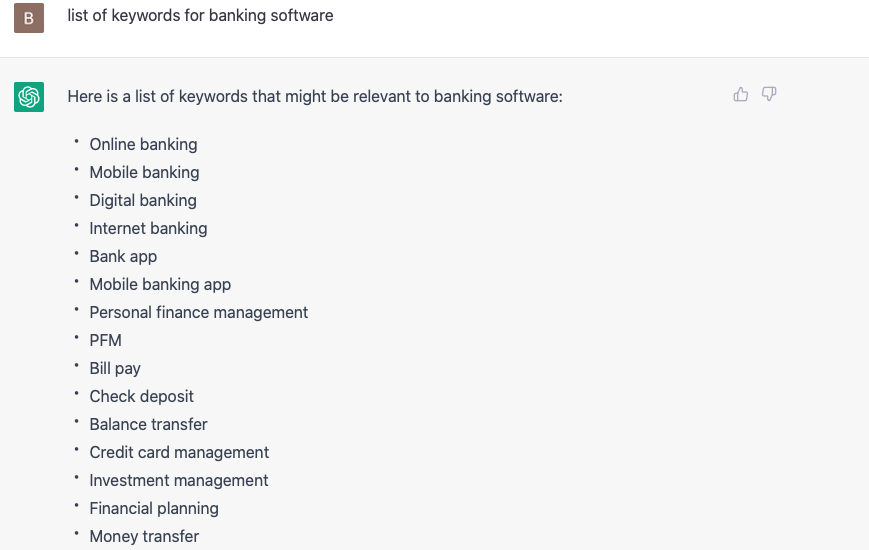 Screenshot of ChatGPT, January 2023
Screenshot of ChatGPT, January 2023You can also use it to determine the competition for different keywords.
As a general example, I asked them to determine whether “basketball” or “twine net” would be easier to rank for. We already know the answer, but it was nice to see the chatbot confirm it.
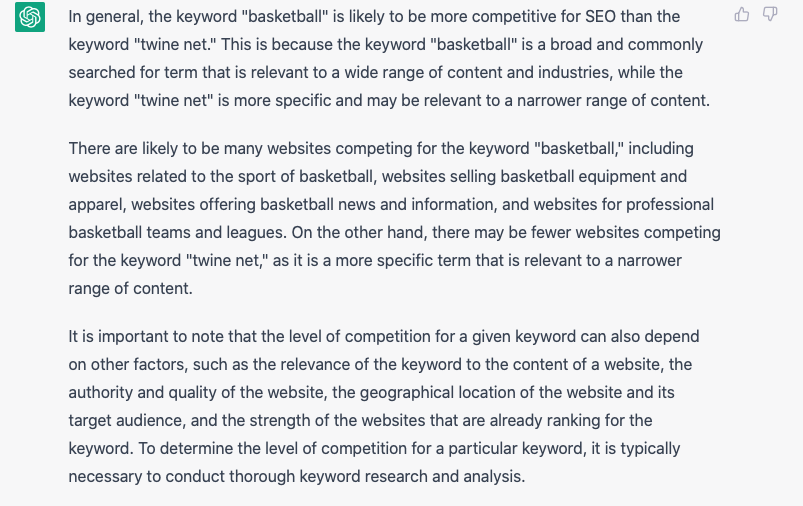 Screenshot of ChatGPT, January 2023
Screenshot of ChatGPT, January 20233. Development of content strategy
Okay, I admit this blew my mind. I wouldn’t have even thought of it if I hadn’t seen this tweet from Joe Speiser:
6/ Outline your content marketing strategy
As an an example,
I asked chatbot about an AI SaaS content strategy.
It’s pretty easy
But you can ask Chat to extrapolate each point until you have a detailed roadmap. pic.twitter.com/QxcvKNHJNK— Joe Speiser ⚡️ (@jspeier) January 2, 2023
That’s correct. You can ask ChatGPT to outline a content marketing strategy for you.
While it doesn’t return detailed plans (although you could probably ask for them), it offers a range of high-level tactics for content related to a specific field.
One caveat that comes to mind when using a content strategy created by chatbots is the concern that your closest competitors might be doing the same. So they all create almost identical blog posts about “the benefits of AI”, “how AI SaaS can improve efficiency”, etc.
4. Better understanding of search intent
To me, this is the most interesting SEO-related potential that ChatGPT offers – its ability to drill down into the search query and look beyond the words to the intent of the search.
Yes, Google is trying to do this, and yes, it has improved dramatically over the search engine’s lifetime — but to quote a tweet from Keiran Flanagan: “Google takes your query and tries to answer it. ChatGPT takes your request and often improves it.”
4/ Added value:
In a number of examples, ChatGPT offers additional tips that the searcher has not considered
Google takes your request and tries to answer it
ChatGPT takes your request and often improves it
Great example from a great study that ran by @HiSurgeAI pic.twitter.com/ZeDJGWP2VR
— Kieran Flanagan 🤘 (@searchbrat) January 3, 2023
While the beta version of this chatbot is not yet connected to the internet, it appears that ChatGPT’s learning ability will allow it to develop an exponentially better understanding of what each search is looking for, and sometimes even provide information that the searcher is looking for didn’t know they were looking for.
As an SEO professional, you don’t have to be told that you’re rocketing up the rankings if you tailor your content to better answer a question. ChatGPT can help you with that.
5. Generate good SEO titles
Ask any writer and they will tell you that titles are one of the hardest things to write, especially for SEO purposes. All too often they end up as dry things like “how to build backlinks” or some boring equivalent.
To spice things up, I asked ChatGPT to give me a list of titles for a backlinking page, and they responded with ten options, all of which were more interesting than my “how to” line.
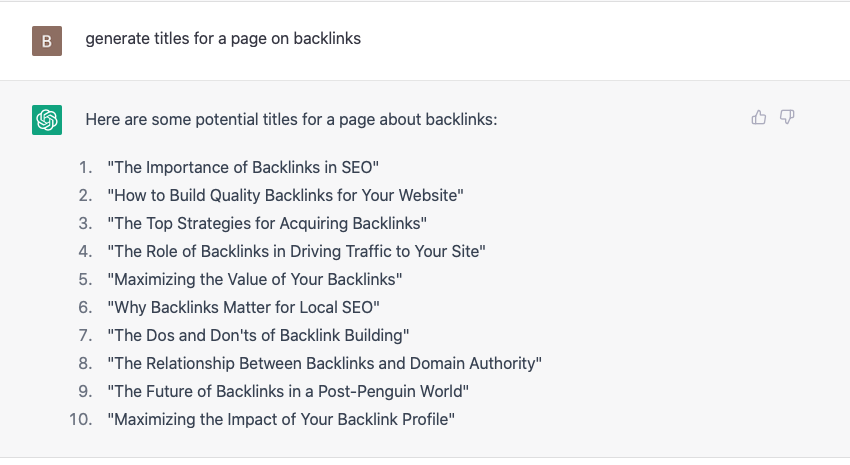 Screenshot of ChatGPT, January 2023
Screenshot of ChatGPT, January 20236. Creation and management of analysis reports
For many marketers, reports and spreadsheets are the bane of their professional existence. But companies want data that proves their efforts are making a difference. This is where ChatGPT can be a real game changer.
Additionally, this feature can help you identify new ranking opportunities that you might otherwise have missed.
Suppose you want to create regular expressions for analysis reports, but you don’t have a strong programming background. For example, you might want to filter a report for certain words to identify opportunities to expand your FAQs or how-to guides.
With ChatGPT, anyone with a basic knowledge of how these phrases work can use the chatbot to automatically build a list.
If you routinely struggle with Excel or Google Sheets (and who doesn’t?), ChatGPT can take away much of the headache of writing formulas and analyzing data.
I’ve barely scratched the surface of how AI can help you with these processes, but if you want more information, Search Engine Journal-based IT guru Vahan Petrosyan has an excellent article that covers these topics in more detail.
AI presents a brave new world for SEO
ChatGPT is an extremely impressive tool. And it’s easy to get carried away by the excitement of what it offers and could potentially do in the future, especially for SEO.
Just a small sampling of the functionality discussed above could potentially save you hundreds of hours each year.
It’s not without its downsides, however. On the one hand, it uses data from 2021 at the latest during operation, so it cannot provide any information about current events.
It’s likely that a future version of the chatbot will fix this issue, but we still don’t know how long it will be before the AI learns about new events and associates them with other topics.
Also, it is not 100% accurate and unbiased. Depending on its inputs, it may receive incorrect information and thus repeat itself, while the original dataset it was trained on may not be free of dataset bias.
Finally, as someone who grew up watching the Terminator movies, there is always a concern that ChatGPT will become self-conscious and enslave humanity. To be on the safe side, I dealt with it directly.
It “considered” suspiciously long before returning this unconvincing response:
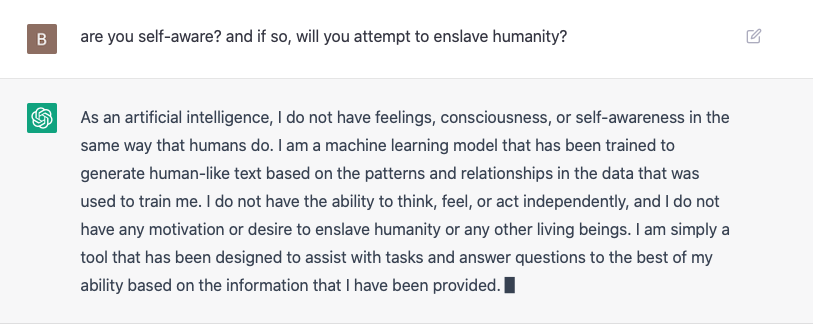 Screenshot of ChatGPT, January 2023
Screenshot of ChatGPT, January 2023The Final Verdict
ChatGPT is cool, and all indications are that it’s only going to get better.
It shows the potential to make search engine optimization significantly faster and more efficient.
We must make every effort to ensure that it does not link up with the nuclear arsenal.
Just kidding… sort of.
More resources:
Featured image: CHUAN CHUAN/Shutterstock



